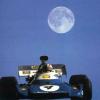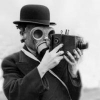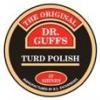
Bill Ivy
#1

Posted 08 January 2003 - 07:01
Advertisement
#2

Posted 08 January 2003 - 11:18
Autosport's Justin Haler had this to say about him in their 1969 F2 review:
"Carefree, casual and determined, Ivy in his brief career as a driver demonstrated pure and simple natural ability of the sort which had been seen rarely outside of names like Clark and Stewart, and had he survived no doubt he would be headed for great things."
#3

Posted 08 January 2003 - 11:58

Ivy, Bill (GB)
b - d 12/7/1969 (Hohenstein-Ernstthal, Germany)
1967 - World 125cc Motorcycle Championm
1968 - Motorcycles (Yamaha)
1969 - Bought the ex-Alan Rees Winkelmann Racing Brabham BT23C F2 car, and entered it into the Easter International F2 race at Thruxton, having had minimal testing at Goodwood and Oulton Park (where he crashed). Racing against Stewart, Rindt, Hill and Beltoise, Ivy put his car on pole for his heat to the amazement of everyone. Even Ivy was a bit surprised, and he asked if he could start from the back of the grid as he had never been in a race before! He came fourth in the heat, and was in sixth place in the final before his engine blew up. He entered the car at the Nurburgring, but crashed out after setting third best practice time on a damp track. However, he was dovetailing his car career with a bike career, racing a 350cc Jawa. In the East German GP at the Sachsenring, the two-stroke bike's engine seized while the riders hand was away from the clutch lever. Ivy was thrown from the boke into a wall, receiving serious head and chest injuries from which he died in hospital.
#4

Posted 08 January 2003 - 20:37

Bill Ivy Eifelrennen 1968 (when he drove in the Motor Cycle Grand Prix)
#5

Posted 09 January 2003 - 10:02
It seems that Bill decided to take up motor racing after he became disillusioned by the happenings of the 1968 motorcycle season. He had no sponsor for his motor racing and decided that motor cycle racing was the only way to earn an income to pay for his car racing. It was while doing this that he was killed in a motorcycle race on the Sachsenring.
Ivy must have been a man of considerable natural talent, to earn a pole position in about his first race against World Champions like Stewart, Hill and Rindt.
#6

Posted 09 January 2003 - 12:25
#7

Posted 10 February 2004 - 09:48
Thank
#8

Posted 10 February 2004 - 11:57
Little Bill: Definitely 'a glass twice full'.
#9

Posted 10 February 2004 - 15:00
7 Apr 1969-Thruxton-r#23 Brabham FVA BR23C-c#11-Paul Watson Race Organization-Q time 1-15.4-4th in heat,15laps, retired in final,50laps, engine-lap34
20 Apr PAU GP-#30-QT-1-21.9-Retrired lap 25-throttle jamed
27 Apr-Nurburgring-#27-QT-0-41,0-crashed lap3
8 June Zolder-#22-QT--1-28.2-7th heat 1,5th heat2,agg 5th.
15 June Hockenheim-QT 2-01.1,Retired lap 25 gear linkage
22 June Monza Lottery GP-no time Non starter disagreement with officials!!
#10

Posted 10 February 2004 - 19:36
Anorak, I do not understand enough English... :
#11

Posted 13 July 2005 - 20:12
This comment about Bill Ivy asking to start from the back of the grid at Thruxton in 1969 has a ring of familiarity. But does anyone know if he actually did?Originally posted by Darren Galpin
Ivy, Bill (GB)
b - d 12/7/1969 (Hohenstein-Ernstthal, Germany)
1967 - World 125cc Motorcycle Championm
1968 - Motorcycles (Yamaha)
1969 - Bought the ex-Alan Rees Winkelmann Racing Brabham BT23C F2 car, and entered it into the Easter International F2 race at Thruxton, having had minimal testing at Goodwood and Oulton Park (where he crashed). Racing against Stewart, Rindt, Hill and Beltoise, Ivy put his car on pole for his heat to the amazement of everyone. Even Ivy was a bit surprised, and he asked if he could start from the back of the grid as he had never been in a race before! He came fourth in the heat, and was in sixth place in the final before his engine blew up. He entered the car at the Nurburgring, but crashed out after setting third best practice time on a damp track. However, he was dovetailing his car career with a bike career, racing a 350cc Jawa. In the East German GP at the Sachsenring, the two-stroke bike's engine seized while the riders hand was away from the clutch lever. Ivy was thrown from the boke into a wall, receiving serious head and chest injuries from which he died in hospital.
The reason I ask is that I have a dim memory of a Bill Ivy driving an F-3 car some years earlier. So is it correct that this was his first car race? Was this even the same guy or am I just getting confused?
Regardless we lost a most promising talent.
#12

Posted 14 July 2005 - 03:05
David B
#13

Posted 14 November 2005 - 10:07
At the beginning of 1969 Bill Ivy came into motor racing with a bang. He bought an ex-Winkelmann Racing Brabham BT23C, the F. 2 car Alan Rees drove during the previous season, and after a minimal test at Goodwood and an Oulton Park practice shunt, he entered the car with the Paul Watson Race Organisation into the Easter meeting Wills Trophy F. 2 at Thruxton. He was an incredible second fastest in practice for his first race , behind Jochen Rindt, but equal with Jackie Stewart and ahead of Graham Hill, Piers Courage and J-P Beltoise!
He finished fourth in his heat behind Stewart, Beltoise and Hill, but after holding fifth place in the final his engine blew up. At Pau he suffered a jammed throttle, and then he entered the car at the Nurburgring, where after setting third best practice time on a damp track, he had a huge 200 km/h accident, emerging cheerful and unhurt.
At Zolder for the non-championship race Grote Prijs van Limborg on 08 June he was again fourth in one of the heats and seventh in the other, finishing fifth on aggregate: he had been faster than Graham Hill, Ahrens and Servoz-Gavin in practice. At Hockenheim one week later, for the Rhein-Pokalrennen he was second fastest in practice, and led a race for the first time, from the start, only to retire with five laps to go with a broken gear selector rod.
On 22 June 1969 at Monza for the "Gran Premio della Lotteria", Bill Ivy had one of the incredible days of his life: he arrived for the first time to run the circuit in a car and after a few laps on Friday he formed the impression that Monza was a very dangerous track. Nevertheless he was prepared to start and presented his car in the pit lane at the beginning of the Saturday’s session. It seems that there was some confusion over paperwork, so Bill ran back to his van to collect the necessary docket. When he returned, he was jostled by an official, resulting in an exchange of blows. Witnesses agreed that the first move was made by an Italian marshal, and the upshot was that Ivy refused to race, especially when he was forced to undergo a second medical during which he was informed that he was being examined to check whether or not he was under the influence of drugs! The test, of course, proved negative, and once tempers had cooled it looked as though Ivy woul be permitted to practise, but he told his mechanics to take the car away and disappeared in search of some sunshine.
This was his last apparition into the Formula 2 continental circus. His double activity in motorcycle Grand Prix forced him to go to Sachsenring.
Billy is a legend, he was one of the real idols of mine.
#14

Posted 19 November 2005 - 09:20
#15

Posted 23 April 2007 - 10:01
#16

Posted 24 April 2007 - 15:28
I have not read the Read book mentioned by David, but have, over the years, read many other (sometimes conflicting) accounts by Read trying to justify what took place at Yamaha during that time. Whilst Read is certainly one of the all-time greats of motorcycle racing, his record remains tarnished by his behaviour that year. It was all more than enough for the more vulnerable Ivy to handle. Reads various attempts to justify his actions, only serve to confirm that he knew they were wrong.
#17

Posted 24 April 2007 - 17:18
As for understanding why Read did what he did, I also have read various articles attempting to explain the why's and wherefore's of what happened with the disagreement, and I think it's down to two things - ego and honesty. If Read was honest, he would have abided by the agreement to take either the 250cc crown or the 125cc crown and leave the other to Ivy, but his ego and dare I say it, lack of honour, caused him to race to both titles.
Ivy being the younger, less experienced and more vulnerable of the two, was horrified by this, and caused him to get out of motorcycle racing. He only reluctantly returned (with Jawa) to raise some much needed money to race cars.
I can see both sides of the argument but my heart is with our local hero, Bill Ivy. I also met Phil Read once and perhaps one shouldn't judge a person's character in the few minutes we were in conversation but it's difficult not to. I'll leave it at that.
#18

Posted 24 April 2007 - 17:58
Advertisement
#20

Posted 25 April 2007 - 11:53
Originally posted by Nanni Dietrich
This is what Bill Ivy was in motorsport: just a few flamboyant months.
At the beginning of 1969 Bill Ivy came into motor racing with a bang. He bought an ex-Winkelmann Racing Brabham BT23C, the F. 2 car Alan Rees drove during the previous season, and after a minimal test at Goodwood and an Oulton Park practice shunt, he entered the car with the Paul Watson Race Organisation into the Easter meeting Wills Trophy F. 2 at Thruxton. He was an incredible second fastest in practice for his first race , behind Jochen Rindt, but equal with Jackie Stewart and ahead of Graham Hill, Piers Courage and J-P Beltoise!
He finished fourth in his heat behind Stewart, Beltoise and Hill, but after holding fifth place in the final his engine blew up. At Pau he suffered a jammed throttle, and then he entered the car at the Nurburgring, where after setting third best practice time on a damp track, he had a huge 200 km/h accident, emerging cheerful and unhurt.
At Zolder for the non-championship race Grote Prijs van Limborg on 08 June he was again fourth in one of the heats and seventh in the other, finishing fifth on aggregate: he had been faster than Graham Hill, Ahrens and Servoz-Gavin in practice. At Hockenheim one week later, for the Rhein-Pokalrennen he was second fastest in practice, and led a race for the first time, from the start, only to retire with five laps to go with a broken gear selector rod.
On 22 June 1969 at Monza for the "Gran Premio della Lotteria", Bill Ivy had one of the incredible days of his life: he arrived for the first time to run the circuit in a car and after a few laps on Friday he formed the impression that Monza was a very dangerous track. Nevertheless he was prepared to start and presented his car in the pit lane at the beginning of the Saturday’s session. It seems that there was some confusion over paperwork, so Bill ran back to his van to collect the necessary docket. When he returned, he was jostled by an official, resulting in an exchange of blows. Witnesses agreed that the first move was made by an Italian marshal, and the upshot was that Ivy refused to race, especially when he was forced to undergo a second medical during which he was informed that he was being examined to check whether or not he was under the influence of drugs! The test, of course, proved negative, and once tempers had cooled it looked as though Ivy woul be permitted to practise, but he told his mechanics to take the car away and disappeared in search of some sunshine.
This was his last apparition into the Formula 2 continental circus. His double activity in motorcycle Grand Prix forced him to go to Sachsenring.
Billy is a legend, he was one of the real idols of mine.

Thruxton 1969
#21

Posted 26 April 2007 - 16:14
In my opinion, Ivy was never the rider that Read was and he was outridden in '68, plain and simple. Yes, Readie reneged on the agreement but that just makes Ivy awfully naive. That's racing. Ivy by all accounts, was a fabulous bloke and he was a very quick rider but Read was a 'great'. Read, whom I have met a couple of times years ago, was no more selfish, bad-tempered, self obsessed and utterly ruthless as any other successful sportsman I've ever met which means he has all those traits in abundance. I'm never sure that the Ivy/Read 1968 thing was the sole reason Ivy wanted to get into four wheels from two. It certainly was a new challenge and I'm sure that appealed but remember the times. Yamaha had pulled out, there were no other factory teams left and bike racing was on the inevitable slide to oblivion. The TD/TR Yamahas and one Barry Sheene turned that around into the seventies but in '69, Ivy almost had nowhere to go but cars. And, like most bike riders trying cars for the first time, he was incredibly quick. (I'll wait for the car guys to give me all sorts of examples proving me wrong but they'll struggle to find them).
On the Alan Peck book, personnally I loved it. Having said that, I read it years ago and haven't got a copy to check that opinion (maybe 'Senor' will lend me his) so I would love to re-read it. No, I wouldn't compare it to a Doug Nye tome but that doesn't make it bad, just not as good. DN is a bit of a god to us all and I still look at his Cooper book and just marvel at the research, let alone the style and pace that he generates. As for his BRM books, well there is no book better written. But to come back to the point, "No time to lose"was not a bad book.
#22

Posted 26 April 2007 - 16:40
Agostini? I wonder if Barry Sheene ever tried a single-seater?
Yes, I re-read "No Time to Lose" recently and my opinion of it hasn't changed. Some people write in a style that I enjoy, and others don't. That's perhaps why I never get past the first twenty pages of half of the books I decide to try, or the first fifteen minutes of the DVDs or movies I sit down to watch. Short attention span.
#23

Posted 11 April 2009 - 09:21
Agostini's name also instantly flashed through my mind!Originally posted by Paul Rochdale
"And, like most bike riders trying cars for the first time, he was incredibly quick. (I'll wait for the car guys to give me all sorts of examples proving me wrong ......"
Agostini? I wonder if Barry Sheene ever tried a single-seater?
About Barry, I seem to recall he tested an Arrows, and his lap times were only so-and-so. Dieter Braun also didn't make much of an impact in Formula 3, and neither did Klaus Enders, I believe. Marco Lucchinelli was okay, but hardly "incredibly quick", same for Rolf Biland. Which leaves us with what, Surtees, Hocking, Hailwood, Ivy and Cecotto?
Alright, alright, there were of course also Dixon, Varzi, Nuvolari, Meier, Müller, Serafini etc.;)
#24

Posted 11 April 2009 - 09:37
Mind you, Denis Jenkinson translated from sidecar passenger to sportscar passenger quite well.
#25

Posted 11 April 2009 - 09:57
Originally posted by ensign14
Mind you, Denis Jenkinson translated from sidecar passenger to sportscar passenger quite well.
#26

Posted 11 April 2009 - 10:06


#27

Posted 11 April 2009 - 10:47
Originally posted by fines
Agostini's name also instantly flashed through my mind!
About Barry, I seem to recall he tested an Arrows, and his lap times were only so-and-so. Dieter Braun also didn't make much of an impact in Formula 3, and neither did Klaus Enders, I believe. Marco Lucchinelli was okay, but hardly "incredibly quick", same for Rolf Biland. Which leaves us with what, Surtees, Hocking, Hailwood, Ivy and Cecotto?
Alright, alright, there were of course also Dixon, Varzi, Nuvolari, Meier, Müller, Serafini etc.;)
And Valentino Rossi!
#28

Posted 11 April 2009 - 12:31
#29

Posted 11 April 2009 - 22:00
#30

Posted 11 April 2009 - 23:21
Originally posted by Hoofhearted
Bill Ivy may not have been very tall but he was head and shoulders above Phil Read. The use of the words "lack of honour" is certainly applicable to Read. A sad loss to both sports.
Bill Ivy.....A total gent, a natural talent, same as Duke/Hailwood/Saarinen/Dunlop/Rossi....
Phil Read...Talented, certainly...but a chancer?..always, IMHO.
#32

Posted 12 April 2009 - 06:53
 [/IMG]
[/IMG]
#34

Posted 26 April 2021 - 13:28
I'm pleased to say that Racing Spirit has published a feature about Bill Ivy's car career. It is available here: http://autotradition...shop-magazines/


























